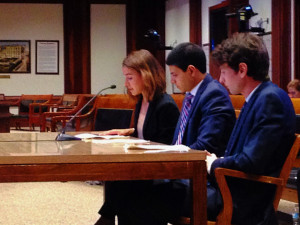Via the Harvard Prison Legal Assistance Project
 On October 14, three PLAPpers joined individuals and organizations from across the Commonwealth at the State House to testify before the Joint Committee on the Judiciary, in support of bills aimed at improving criminal justice. Despite little advance notice, a dozen PLAPpers volunteered to do research and draft written testimony for the Committee’s review, and three PLAPpers – Michael Mullan (LLM), Katherine Robinson (1L), and Eddie Nasser (1L) – appeared in person to present oral testimony on PLAP’s behalf. Dozens of bills were on the Judiciary Committee’s agenda, but PLAP focused on three issues of considerable importance to its clients.
On October 14, three PLAPpers joined individuals and organizations from across the Commonwealth at the State House to testify before the Joint Committee on the Judiciary, in support of bills aimed at improving criminal justice. Despite little advance notice, a dozen PLAPpers volunteered to do research and draft written testimony for the Committee’s review, and three PLAPpers – Michael Mullan (LLM), Katherine Robinson (1L), and Eddie Nasser (1L) – appeared in person to present oral testimony on PLAP’s behalf. Dozens of bills were on the Judiciary Committee’s agenda, but PLAP focused on three issues of considerable importance to its clients.
Solitary Confinement. Michael Mullan expressed PLAP’s support for two bills: one that would require the Massachusetts Department of Correction to collect data and report on the usage of solitary confinement in state prison, and another that would substantially limit the use and duration of solitary confinement. Mr. Mullan highlighted PLAP’s unique familiarity with this issue, as PLAPpers represent state prisoners in dozens of disciplinary hearings each year, with solitary confinement always a potential sanction (and often a feature of the pre-hearing process). For serious charges, the DOC permits sentences of up to ten years in solitary confinement, making Massachusetts an outlier nationally.
Mr. Mullan described the dehumanizing effects of solitary confinement, effects which are well known and acknowledged by experts in many different fields. Being locked in a small, cramped cell, with solid doors and limited natural light, for 23 hours a day, day after day, takes a heavy toll on the inhabitant. The harm done to prisoners in solitary is also visited on the community, as most prisoners are eventually released. The transition to society, which is already difficult, is made even more so when a person has been deprived of normal stimuli or social interaction for extended periods of time.
Mr. Mullan submitted PLAP’s position that given these harms, the DOC should be reporting its usage of solitary confinement, so that it can be monitored and studied, and long-term solitary confinement should be eliminated. Mr. Mullan reminded lawmakers that solitary confinement is imposed not only on the guilty but on those merely accused of violating prison rules, with indefinite confinement for weeks or sometimes months.
Filed in: Clinical Voices, Pro Bono
Contact Office of Clinical and Pro Bono Programs
Website:
hls.harvard.edu/clinics
Email:
clinical@law.harvard.edu